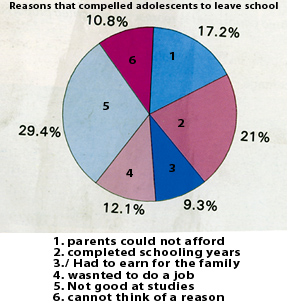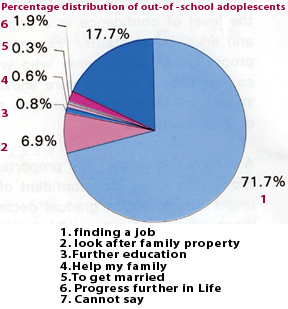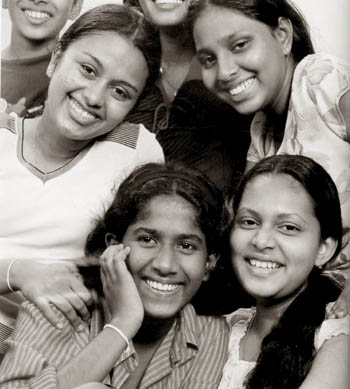|
observer |
|
|
|
|
|
OTHER LINKS |

|

|

|
Adolescence: Problems and challenges :Engendering blockades of our generation
|
|
|
One's social status, place of living whether in villages or metropolitans and the immediate kith and kin and their professional and social status contribute to the formation of the adolescent's outlook of life and the hopes and aspirations. However, one cannot overrule the overarching influence of parents exerted on their children and their general outlook on life.
By and large it is the parents who are responsible not only for the physical nourishment of their children but also their mental wellbeing and future expectations.
At a tender age, parents sow the seeds of hope and aspirations in the minds of their children and set the targets in life which in Sri Lanka are more often confined to certain preferred professions such as doctor, lawyer or engineer.
Most of the middle class parents try their best to make their children either doctors or engineers, often totally disregarding the inherent abilities of their children. In the process, they have wilfully ignored some of the basic tenets of education such as healthy attitude development resulting in producing robotic-like professionals whose be all and end all of life is to get married to a wealthy partner with a considerable fortune.
Education has not changed even a bit of their parents' narrow-mindedness or organic racism and blindly adheres to some of the most archaic forms of traditions and customs that hindered women's freedom and dignity. Women for them are mere instruments of flesh and blood at their hands that serve as housemaids to fulfill their sexual desires, procreate and manage the household.
On the other hand, most of the parents consider their offspring as tools to achieve goals that they themselves failed in their lives and to carry on their lineage. Therefore, the parents often do not consider children as individuals with their own hopes and aspirations, and desire partners for their adolescent children, especially for girls.
Parental pressure has often resulted in incongruous partners entering into wedlock and make no contribution to the wellbeing and the development of society and culture. This situation has worsened by the fact that children with a degree in certain disciplines embolden their parents' demand of exuberant sums of money as dowry from prospective brides. This has become a serious issue, especially, in this country which is a bedrock of traditionalism and conventions.
 |
 |
The recent findings of an islandwide survey conducted by UNICEF among the adolescents revealed that the primary expectation of most of the adolescents who were out-of- school, was finding a job which is accounted for 71.7 per cent, while about 7 per cent opted to looking after their family properties.
However, less than one per cent is interested in perusing higher studies and about two per cent have no particular identified target in their lives. A significant proportion (18%) was, perhaps, undecided and unable to identify a future expectation.
It has also been observed that the proportion of adolescents who were expecting a job increase with the age and was higher among boys while girls opted for further studies. The highest proportion of adolescents who wanted to find a job (74%) was among the Sinhalese while the highest proportion of those who did not have any future expectations was among the Muslims (25%) , followed by Tamils.
The North and East sectors had the highest proportions of adolescents (22%) with no future expectations and a lower proportion (63%) expecting to find a job relative to other sectors. North and East had the highest proportion (15%) of those who wanted to look after their own properties.
Confidence on ability to face potential future predicaments.
The majority of the out-of-school adolescents showed confidence that they could face problems that may occur in the future. 40 % said they were very confident while another 47.4 % were somewhat confident. Less than 10% had reservations about their ability to face future challenges.
However, apparently there is no difference in gender in the level of confidence and the highest proportion of persons that responded as 'very confident' and 'confident' was among the Sinhalese, while the percentage was equal among the Muslims and Tamils.
It has been observed that an overall level of confidence rise with increasing socio-economic level. The highest proportion of adolescents who were not so confident was found in the Colombo Metro sector compared to rural areas where the lowest was recorded.
Conviction on an unwavering future
Interestingly the survey indicated that half of the adolescents expressed that they were somewhat confident about a brighter future while 37 % were very confident of a brighter future. Seemingly there were no gender difference in this respect. Although there was a significant link between the education and the level of confidence of a brighter future, a drastic decline was observed among those with O/L or A/L education.
Self-awareness of their skills
The one per cent of adolescents both male and female perceived themselves as those who did not possess skills of any value. The Sinhalese had the lowest proportions (29%) who thought they had no valuable skills, while the proportion among the Tamils and Muslims were 37 per sent and 38 per cent respectively.
The proportion that perceived they had no skills decreases as socio-economic level increases. However, the highest proportions who perceived as those who were without valuable skills was from the North and East (44%) sector followed by Colombo Metro (41%).









